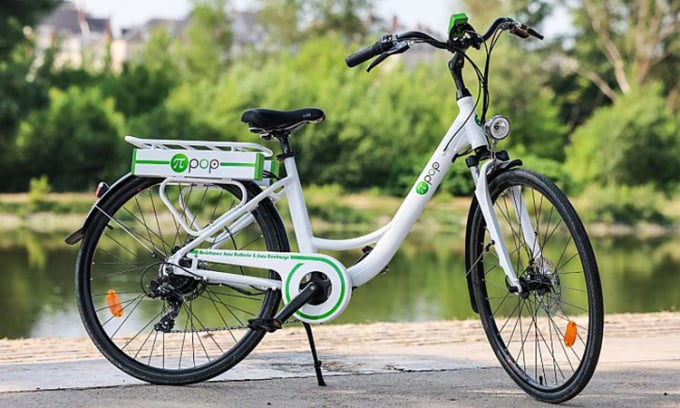French startup Pi-Pop introduces electric bikes equipped with supercapacitors instead of lithium batteries, offering efficient and environmentally friendly rides.

Pi-Pop's electric bike. Photo: Pi-Pop
Supercapacitors are capacitors that can store large amounts of energy, often 10-100 times more than conventional capacitors, and are popular for their ability to charge quickly. Supercapacitors are not entirely new technology. Experts first produced supercapacitors in the late 1970s. Since then, they have been used in photovoltaic systems, digital cameras, electric and hybrid vehicles to improve efficiency. Integrating supercapacitors into electric bicycles is a logical step towards "green transportation".
Unlike conventional electric bikes that run on lithium batteries, Pi-Pop takes advantage of the power of supercapacitors to store and release electricity. This technology focuses on energy regeneration, recharging when the rider pedals, goes downhill or brakes, Interesting Engineering reported on September 22.
While lithium powers electric vehicles, its extraction poses a host of ecological problems, from pollution to biodiversity loss. Furthermore, demand for lithium is expected to outstrip supply by 2030. Pi-Pop’s electric bike is an alternative to lithium-dependent vehicles that addresses these concerns.
Unlike lithium batteries, supercapacitors are made from common materials such as aluminum, carbon, cellulose and polymers, which are easily recycled. Supercapacitors have significantly more charge cycles than lithium batteries, ensuring a longer lifespan and reduced waste.
Pi-Pop's electric bike is equipped with an advanced energy storage system based on supercapacitors with a lifespan of up to about 10 - 15 years, significantly exceeding the typical lifespan of lithium batteries (about 5 - 6 years). These supercapacitors are not only environmentally friendly but also completely recyclable.
The electric bike comes in a sleek white design and weighs around 21.7 kg, making it suitable for riders between 155 and 185 cm tall. Designed for both men and women, the bike offers continuous electric assistance, helping riders reach speeds of up to 25 km/h with its 250 W motor. The lithium-free model is expected to cost $2,610.
Pi-Pop is manufacturing its e-bikes in Orléans, France, at a rate of 100 per month. The company hopes to be able to produce 1,000 per month by 2024.
Thu Thao (According to Interesting Engineering )
Source link



![[Photo] Collecting waste, sowing green seeds](https://vphoto.vietnam.vn/thumb/1200x675/vietnam/resource/IMAGE/2025/10/18/1760786475497_ndo_br_1-jpg.webp)
![[Photo] General Secretary To Lam attends the 95th Anniversary of the Party Central Office's Traditional Day](https://vphoto.vietnam.vn/thumb/1200x675/vietnam/resource/IMAGE/2025/10/18/1760784671836_a1-bnd-4476-1940-jpg.webp)
![[Photo] Closing ceremony of the 18th Congress of Hanoi Party Committee](https://vphoto.vietnam.vn/thumb/1200x675/vietnam/resource/IMAGE/2025/10/17/1760704850107_ndo_br_1-jpg.webp)




































































































Comment (0)